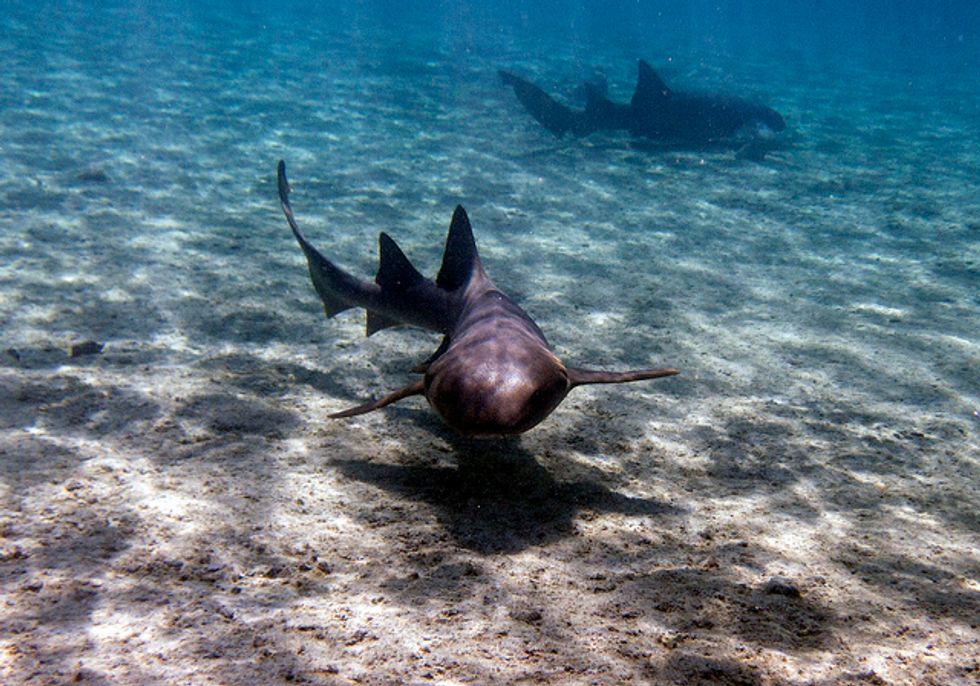
© 2024 Blaze Media LLC. All rights reserved.
Ouch! Florida Woman Taken to the Hospital With Shark Still Attached to Her Arm
May 15, 2016
"I have never seen anything like it."
A 23-year-old Florida woman was taken to the hospital Sunday afternoon because of a shark bite. But, according to the Boca Raton Fire Rescue, the nurse shark was still attached to her arm.
"I have never seen anything like it. Never even heard of anything like this," Ocean Rescue Capt. Clint Tracy, who saw the woman and the shark as they were transferred to an ambulance at Red Reef Park, said, according to the Sun-Sentinel.
Overall, Tracy said the woman remained calm, adding that there was only a little bit of blood. A splint board was used to support the woman's arm and the shark as she lay on the ambulance stretcher, he said.
The woman, whose name was not released, was taken to the Boca Regional Hospital by Boca Raton Fire Rescue and she is in stable condition, according to spokesman Robert Lemons.
The shark was dead before emergency responders arrived at the scene, "but was still attached to her arm," Lemons said. Tracy praised the life guard who helped the woman, saying, "The guard responded calmly, called for backup, and the lieutenant called fire rescue."
Several beachgoers said they saw the woman and her friends antagonizing the shark. According to Nate Pachter, 11, said he and his cousin were snorkeling when they saw the group "holding the shark by its tail. They were messing with it."
"Sharks are like the most humane thing ever," Patcher said. "So it wouldn't bite them if they hadn't been messing with it."
Nurse sharks are extremely common in offshore Florida and can grow up to 14 feet in length. The creatures are able to remain totally still as they breathe by pumping water through their mouths and out of their gills. In fact, according to researchers, the small sharks are sometimes seen stationary on the ocean floor.
Nurse sharks are known for having strong jaws and thousands of tiny teeth.
"Knowingly or not, people swim near nurse sharks every day without incident," according to the National Park Service. "Attacks on humans are rare, but not unknown, and a clamping bite typically results from a diver or fisherman antagonizing the shark with hook, spear, net or hand."
"The bite reflex is such that it may be some minutes before a quietly re-immersed nurse shark will relax and release its tormentor," they added. "The small teeth seldom penetrate deeply but are razor sharp."
Holding still reduces the damage for both shark and human, according to the NPS, adding that leaving sharks alone "is the best tactic."
—
Follow the author of this story on Twitter:
Want to leave a tip?
We answer to you. Help keep our content free of advertisers and big tech censorship by leaving a tip today.
Want to join the conversation?
Already a subscriber?
more stories
Sign up for the Blaze newsletter
By signing up, you agree to our Privacy Policy and Terms of Use, and agree to receive content that may sometimes include advertisements. You may opt out at any time.
© 2024 Blaze Media LLC. All rights reserved.
Get the stories that matter most delivered directly to your inbox.
By signing up, you agree to our Privacy Policy and Terms of Use, and agree to receive content that may sometimes include advertisements. You may opt out at any time.


